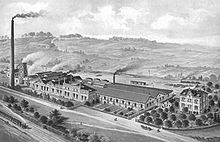Ideal spade
The Ideal-Bredt GmbH & Co. KG is a company in Herdecke at the Ruhr . The company has around 100 employees and annually produces 1,000,000 shovels and 400,000 spades for the German market and export.
history
The shovel and spade factory Eckardt & Co, a limited liability company , was founded in 1899 by the factory owner Emil Eckardt († 1928), the entrepreneur Kommerzienrat Gustav Vorsteher and Christian Sondermann, a grandson of the Oberberg industrial pioneer Johann Wilhelm Sondermann . On April 15, 1899 the foundation stone of the company was laid, and on February 10, 1900, the production and sale of shovels and plow belts with 84 employees could begin. From 1903 the ideal spade came onto the market, a spade in which the blade and pen were made from the same piece for the first time. Around 1906 the company built a small workers' settlement of 6 houses with 4 apartments each in Herdecke, which is now a listed building.
During the First World War , women were used in production because of the labor shortage. In 1925, the plant underwent a significant expansion.
Emil Eckhard died in 1928 and the company ran into financial difficulties a short time later. On December 21, 1928, bankruptcy had to be filed and around 240 workers became unemployed.
The bankruptcy estate was finally taken over towards the end of 1929. The shareholders included Dr. Otto Thomashoff and Karl Gapp from Hagen. The new company was named Idealspaten- und Schaufelwalzwerke vorm. Eckardt & Co., GmbH, Herdecke (Ruhr) .
From 1935 the company supplied the Reich Labor Service and the Wehrmacht with spades. In 1938 the workforce rose to 547 employees. In the fall of 1939, was divided in the wake of linearization previously in Jewish situated possession Teplitzer ironworks, shovel and finished goods factory AG in Teplitz , Czech Republic to, the company.
During the Second World War, the company again suffered from a labor shortage. They fell back on several hundred prisoners of war and foreign workers , mainly from Poland and Russia , who were housed in a fenced barrack camp from 1941, guarded by a unit of the Wehrmacht. In 1943 another warehouse was set up on the company's premises. The conditions of the camp included hunger and abuse. Several forced laborers were killed.
After the Second World War , the company experienced an upswing and had more than 500 employees. During the 1960s, competition from foreign products increased while demand decreased.
In 1971 the company was merged with A. Bredt & Co. KG Witten from Witten and was from then on called Idealspaten- und Schaufelwalzwerke A. Bredt GmbH & Co. KG or Idealspaten-Bredt GmbH & Co. KG for short .
literature
- Willi Creutzenberg: Now continue to work with courage, perseverance and trust in God! Highlights from the hundred-year history of the Herdeck shovel and spade factory. Part 1. - Article in: Herdecker Blätter, Issue 15 (May 1999), pages 11-18 online version ( Memento from April 7, 2005 in the Internet Archive )
- Willi Creutzenberg: We ask you to take the refugee into custody and the go. Surrender to State Police. Highlights from the hundred-year history of the Herdeck shovel and spade factory. Part 2. - Article in: Herdecker Blätter, Heft 16 (November 1999), pages 23–30 online version ( Memento from April 7, 2005 in the Internet Archive )
- Willi Creutzenberg: POWs and forced laborers at the Idealspaten company. Working for the enemy - On the situation of forced laborers in Herdecke during the Second World War - Part 2. - Article in: Herdecker Blätter, Issue 19 (November 2001), pages 15-22
Web links
Coordinates: 51 ° 24 ′ 8.7 " N , 7 ° 25 ′ 39.9" E
